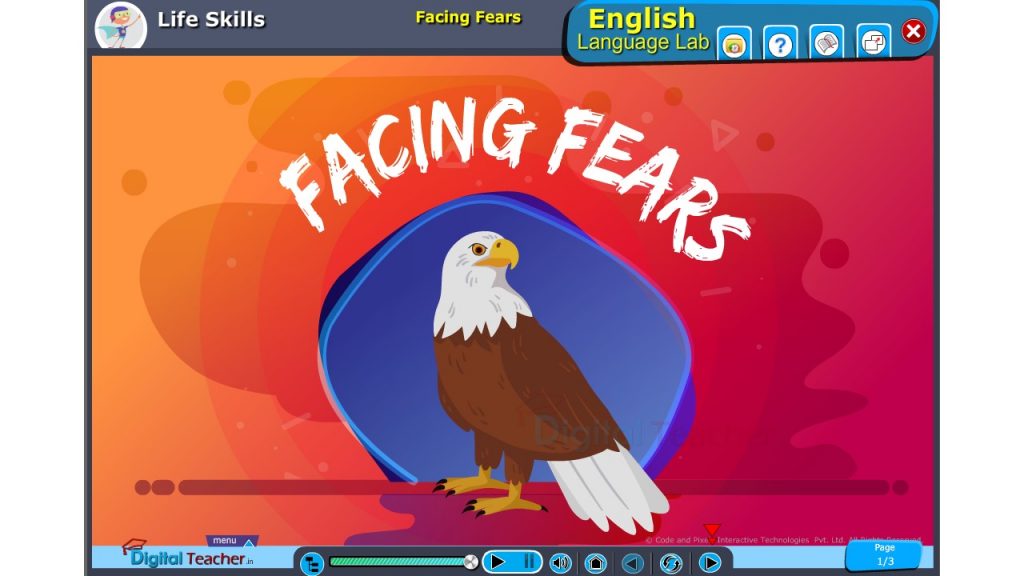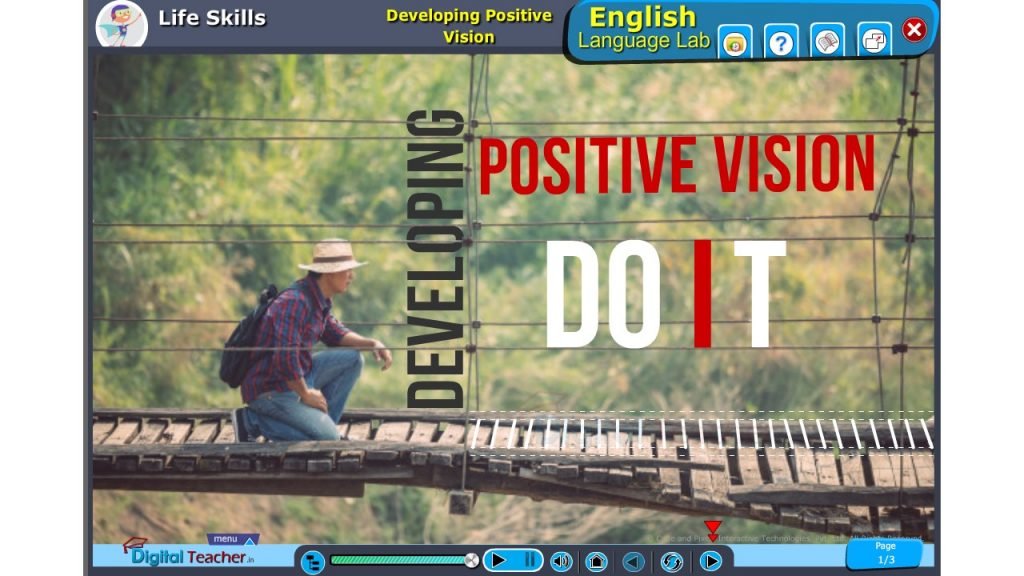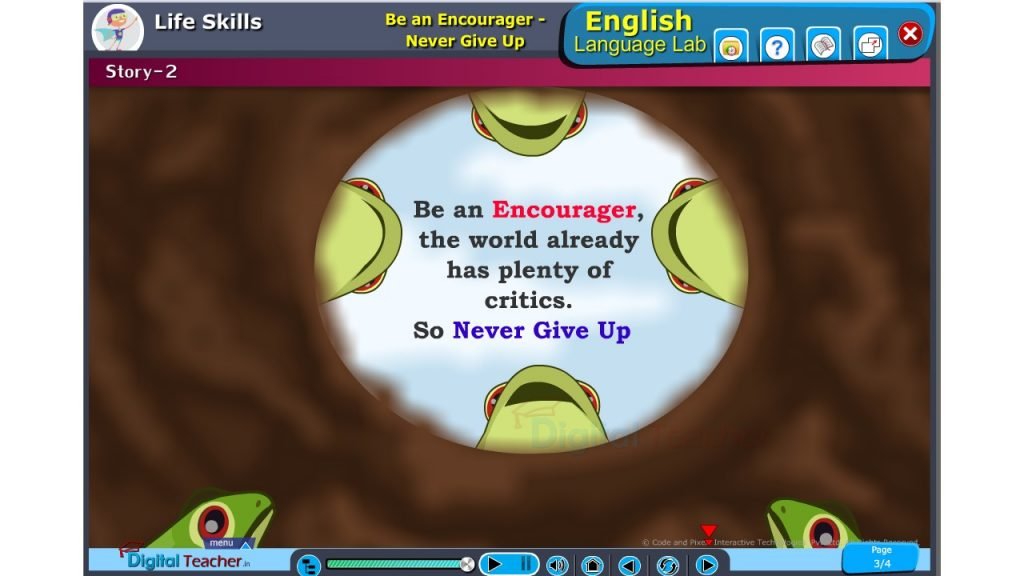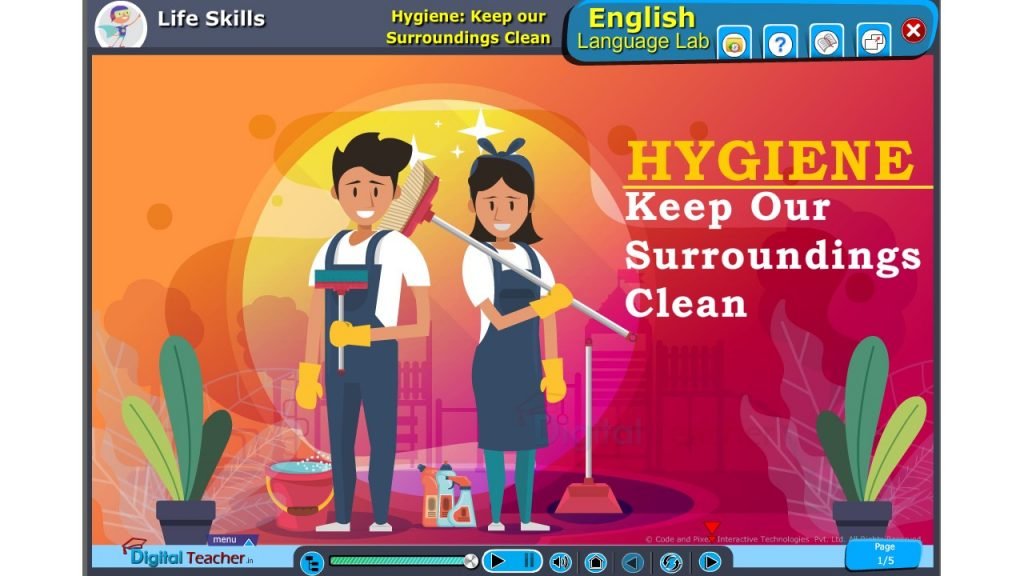In today’s changing life, as well as where skills are as important as the process of learning, what we teach must provide students with needed life skills. Such skills, include Self-introduction, the Importance of Relationships, Doing Good to Others, Good Touch and Bad, Touch Facing Fears, Finding Fun in School.. and many more…
Decision-making, not only prepares the students for young people but also enables them to perform well in an environment of instabilities. As we work to develop a skilled young generation, knowing and moving these life skills is essential for creating effective and flexible people around the world.
Top 19 Life Skills Education for School Students Using English Language Lab Software?
Using our English Language Lab Software, school students can engage in a fun and effortless learning experience to master these 19 fundamental life skills.

Digital Teacher English Language Lab Software is an offline English language learning software that uses interactive activities to increase student engagement and develop engaging educational environments. This software focuses on the top 19 life skills students need to learn, to prepare them for the future. These skills include:
- Self-introduction
- Importance of Relationships
- Doing Good to Others
- Good Touch and Bad Touch
- Facing Fears
- Finding Fun in School
- Developing a Positive Vision
- Hygiene: Keeping Our Surroundings Clean
- Eating Healthy Food and Staying Healthy
- Valuing What You Have
- Honesty
- Being an Encourager – Never Giving Up
- Common Sense
- Patience – Managing Anger
- Out-of-the-Box Thinking
- Needs vs. Wants: Understanding the Value of Money
- Teamwork and Cooperation
- Time Management
- Planning for the Future
These activities are designed to be fun and age-appropriate, promoting a growth mindset in students. The platform enhances speaking, listening, reading, and writing skills and is developed according to CEFR standards (A1, A2, B1, B2, C1, and C2). Special activities are included to help overcome Mother Tongue Influence (MTI) by addressing pronunciation differences through specific mouth movements.
Before diving into the top “19 essential life skills for students,” it’s important to understand the basics of what life skills are.
Understanding What is the Basic Life Skills?
To grasp the fundamentals of life skills for students requires knowing important skills that enable them to handle life properly. Such skills include problem-solving, critical thinking, communication, decision-making, and others. Understanding these fundamentals is important to their personal development and long-term success.
Now following having covered the importance of life skills, let’s look at the 19 fundamental life skills that every school student should know. Each of these skills is essential for personal development and future success, and we’ll look at each one in depth to discover how they could help students in their everyday lives.
Top 10 Essential Life Skills: Starting with No.1 (Self Introduction)
Now that we have a strong knowledge of life skills, let’s look at the top ten out of the 19 important skills. First on our list is Self Introduction. The table below highlights essential tips and aspects of introducing yourself confidently and effectively.
| Topic | Explanation |
|---|---|
| Why Self-Introduction Matters | Self-introduction is important for offering a good first impression, whether at school, an event, or on a professional occasion. It allows you to connect with others and leave an unforgettable mark. |
| Being Gentle and Confident | Begin with a smile and define yourself completely. Sharing information about your interests or hobbies in a polite manner makes you appear open and confident. |
| What To Include In Your Introduction | Mention your hobbies and interests, such as playing chess, reading, and listening to music. This provides folks with an idea of who you are. |
| Good Etiquette for Introductions | Always start with a smile and a polite hello. Have a nice interaction, use respectful language and correctly share names. |
| Why is Self-Introduction Important? | An excellent self-introduction displays your personality and allows people to get to know you. Speak bravely about yourself without looking self-centred. |
| Using Self-Introduction in Different Situations | In lots of situations, such as making a speech or meeting new people, a clear introduction can assist in defining confidence and smooth interactions. Even if you’re scared, a quick, nice introduction may have a great effect. |
| Tips for Confident Speaking | In interviews or workplaces, stand tall, use courteous language, and express gratitude. You may make a positive impression by maintaining good posture and communicating clearly. |
| Expressing Gratitude and Sharing Attributes | Be grateful for the chance and offer some personal characteristics. This helps others understand who you are and develops your bond with them. |
Now that we’ve covered the key concepts of self-introduction, let us move on to our next essential life skill: the importance of relationships.
No.2 Importance of Relationships:
Developing real relationships with family, friends, and coworkers is an important life skill for students. These ties are the cornerstone of our social life, influencing our beliefs and actions. Trust and loyalty are crucial, and heartfelt apologies may heal and build relationships.
In today’s digital era, genuine, meaningful relationships are unmatched in the world Parental love and support form what we become, while communicating allows students to overcome difficulties and live happier lifestyles.
To learn more about relationships, we recommend watching the above cartoon version “Importance of Relationships | Digital Teacher.” This comprehensive and fascinating video explains how developing and keeping real connections may benefit many parts of life.
It clearly shows important concepts and provides useful insights into how to build successful relationships with family, friends, and colleagues. Don’t miss this chance to watch the concepts in action and get a better understanding of how connections affect children’s life skills.
No.3 Do Good to Others
After seeing the above video about the value of relationships, we can move on to our next important life skill: Do Good to Others.
This section focuses on the importance of kindness and giving in creating a happy and supportive community. We’ll look at how little acts of kindness and helping others benefit people around us while also contributing to our personal growth and well-being.
Let’s look at why doing good is necessary for creating meaningful connections and living a fulfilled life.
The Importance of Doing Good to Others in Life – Life Skills for Students
- Kindness: Helping others and being nice is important for developing strong connections.
- Empathy: Giving people a voice that indicates concern shows empathy and support.
- Kindness to Parents: Treating your parents with kindness is essential for creating a healthy family tie.
- Believe in Yourself: Self-confidence is essential for attaining success and creating a good impression.
- Improve Life Skills: Doing good for others helps you develop your life skills and personal growth.
- Respect Over Appearance: True respect and success are derived from your character, not your appearance.
- See the Best in Others: Always try to identify and appreciate people’s best characteristics.
No.4 Good Touch and Bad Touch
“Understanding Good & Bad Touch, Ensuring Child Safety” involves explaining the key differences between comfortable and unwanted touches, knowing private body areas, and offering practical guidance for children to stay safe from unwanted contact or situations, helping them feel secure and protected.
Learning Good and Bad Touch: Supporting Child Safety
- Good Touch: It feels comfortable and caring, like being hugged by a loved one.
- Bad Touch: If someone touches your private body parts, yell “No!” away, and notify someone you trust right away.
- Reacting to Danger: Be aware of potential risks and know how to respond.
- Responding to Uncomfortable Situations: If you are uncomfortable, scream, leave, and notify a trusted person.
- Protect yourself: Learn how to avoid unwanted contact.
- Responding to Strangers: Teach children how to handle strangers at the door without being safe.
To have a better understanding, students can view our above video “Understanding Good & Bad Touch | Digital Teacher,” which covers essential life skills for students by showing how to successfully understand and react to different types of touch.
No.5 Facing Fears
Facing fears has significance for personal development. Nature, especially the eagle, teaches us amazing lessons about overcoming difficulties. By observing how an eagle deals with a thunderstorm, we may learn to face ourselves and our worries and turn challenges into opportunities for growth.
Let’s look into these life lessons and see how we may apply them in our lives.

Facing Fears: Life Lessons from the Eagle 🦅 (Example Story)
Facing fears is an important aspect of personal development and success. We may acquire important lessons from eagle behaviour, just as other species do in nature when faced with a challenge.
Think about how a kite 🪁 responds during a thunderstorm. Instead of rising above it, the kite flies about and battles against the wind. On the other hand, an eagle takes a different strategy. When a storm strikes, the eagle 🦅 does not back down from the task. Instead, it flies above the storm, leveraging the strong winds to lift itself higher into the sky.
Steps to Overcome Your Fears (with an Example)
- Accepting Difficulties and Fearlessness
- Soar like an eagle by overcoming challenges.
- Confronting worries helps to build mental toughness and resilience.
- Learn how to manage future situations better.
- Take inspiration from the eagle and see your worries as possibilities for progress.
No.6 School is Fun
By making learning fun and engaging, the “School is Fun” module seeks to improve students’ attitudes toward education and their time at school in general.

“Section on School is a Path to Fulfilling Goals and Learning Good Things”
- Focuses on making the school experience enjoyable and engaging.
- Explores finding joy in learning.
- Develops a positive attitude towards school.
- Enhances overall educational journey.

No.7 Developing Positive Vision
Here’s how you can explain “Developing a Positive Vision” using the example of “Lessons from Elephants and Frogs”:
Perseverance and Observation: Key Life Skills
The story of elephants and frogs teaches important lessons about strength and the power of our beliefs.

Example 1: The Elephants and the Small Rope:
- Elephants, even when fully grown, are usually chained to a little rope that they may easily break. They were raised to believe that they could not escape. That shows the limitations we set on ourselves.
- The elephants’ carry out suggests us not to accept limitations without challenging them. It suggests the importance of challenging the present status standard and believing in the potential we have.

Example 2: The Pit and the Frogs Trapped Inside the Pot
A group of frogs fell into a deep pit and attempted to jump out, but none succeeded. Many of the frogs, discouraged by their repeated failures, gave up and accepted their destiny. Ignoring the other frogs’ negative words, the two frogs continued their jumping.
One of these rude frogs was deaf and couldn’t hear the negativity surrounding it, but it continued with determination. Eventually, this deaf frog was able to jump out of the gap and escape, showing that effort and ignoring failure can result in success.
The above stories tell us that keeping feeling positive and focused in the face of difficulties allows us to overcome difficulties and achieve our goals.
Next, let’s look at an important life skill that affects our health and well-being: maintaining cleanliness and keeping our surroundings clean. Good hygiene practices are necessary not just for our health, but also to maintain a healthy environment around us.
No.8 Hygiene: Keep Our Surroundings Clean
In the following section, we will look at some practical examples and ideas for maintaining cleanliness and improving hygiene in our daily lives. Let us take a more detailed look at these important habits.

To help the students understand the value of cleanliness as a fundamental life skill, I’ll tell you a story about how an area’s work to maintain hygiene improved everyone’s health.
This example will help you understand the practical benefits of keeping our surroundings clean. Let’s go into the story to see why cleanliness is important.
Cleanliness for Health: A Story of Community Action ( Example Story)
Mohan, Vijay, and Arjun were three close friends who cherished attending school together in their school days. One day, Arjun didn’t come to school, so Mohan and Vijay went to check on him. They were shocked to see Arjun’s home was very unclean, with garbage and water that was standing surrounding it. This mess was attracting mosquitoes, and Arjun was sick with malaria because of it.

Mohan and Vijay decided to help. They planned an entire area cleanup, cleaning up waste and removing polluted water. Their efforts were rewarded: the area was soon clean, mosquitoes were gone, and fewer people got sick.
Moral of the Story:
The story points out that keeping our surroundings clean is important not just for visual appeal, but also for our health. Maintaining cleanliness is an important life skill for students since it keeps everyone healthy and happy.
| Topic | Key Points | Benefits for Students |
|---|---|---|
| Importance of Hygiene | Cleanliness prevents illnesses | Encourages regular personal and environmental hygiene. |
| Health Risks | Poor hygiene can lead to diseases like malaria | Highlights the need for healthy living conditions. |
| Team Effort | Students cleaned streets together | Teaches the value of teamwork and community involvement. |
| Wider Impact | Local cleaning efforts had national impact | Local cleaning efforts had a national impact |
| Neglecting Hygiene | Poor hygiene affects opportunities (e.g., sports selection) | Reinforces the connection between cleanliness and success. |
| Survival | Being presentable and prepared matters | Fosters habits for professionalism and readiness. |
| Selection Criteria | Hygiene can impact eligibility for activities | Encourages good personal habits for better opportunities. |
| Overall Benefits | Hygiene improves health and relationships | Enhances overall quality of life through better health and social interactions. |
The above table shows students how personal hygiene and cleanliness affect their lives, highlighting the practical benefits of these life skills.
No.9 Eat Healthy Food and Stay Healthy
To learn more about the importance of healthy eating, watch the video we’ve prepared for you. It teaches you all you need to know about making healthful choices and being healthy.
In this video, you will learn:
- Why it’s necessary to eat healthy instead of bad food.
- How consuming nutritious foods keeps you healthy and energetic.
- Tips for developing healthy eating habits in children.
- The advantages of eating a mix of foods in your diet.
- How understanding different sorts of food may benefit your overall health.
- A healthy diet plays an important part in your overall health.
- Simple methods to include healthy eating into your everyday routine.
No.10 Value What You Have
Valuing what we have is important in today’s fast-paced world because it allows us to recognize the good things in life, such as relationships, resources, and personal achievement. Recognizing and being grateful for what we own inspires a positive attitude and interest in our everyday life.
Life Lessons: Value What You Have, Not What You Don’t
The Story of Ramya
Once upon a time, there was a girl named Ramya who lived in a small village. Her village had limited education opportunities, so when she got the chance to move to a city for better studies, she was thrilled. Ramya got into a prestigious school in the city and felt excited about her new adventure.
However, life was not always simple for Ramya. Some classmates at her new school teased her about her basic clothes and background. With this, Ramya remained cool and focused, even during surprise examinations in which others got nervous and nervous.
One day, during a surprise test, Ramya became helpless during a surprise exam. She had just recently started studying the subject, but they had learnt about it recently. Ramya took her time, attempted her hardest, and gave helpful replies to the questions rather than giving up.
The teacher noticed Ramya’s efforts and was reminded of the importance of valuing life’s simple gifts. Ramya’s story taught everyone a valuable lesson: appreciate what you have and use your strengths to overcome challenges.
Moral of the Story
- Value What You Have: Instead of focusing on what you lack, consider the opportunities and skills you do have. Every challenge is an opportunity to develop and express your greatest abilities.
I hope you found the article about the “Top 19 Life Skills for Students” informative and useful. Such skills are essential for students for growth and can help them both in school and socially.
Thank you for taking the time to read about these Top 10 Life Skills for students,! Stay tuned for the next post, where I’ll go over the remaining nine life skills for students and discuss their value and usefulness.
For people looking forward to improving their English language skill sets, as well as their life skills and soft skills, our Digital Teacher product, English Language Lab Software, provides a complete collection of activities that focus on LSRW skills(Listening, Speaking, Reading, Writing).
Contact us @ 90000 90702 / Visit: www.englishlab.co.in today to learn more and take your college or school student’s language learning to the next level!

Thank you for following along, and I hope to share more with you soon!
Also, read – Top 9 Life Skills for School Students Using Digital Language Lab Software


Leave a Reply